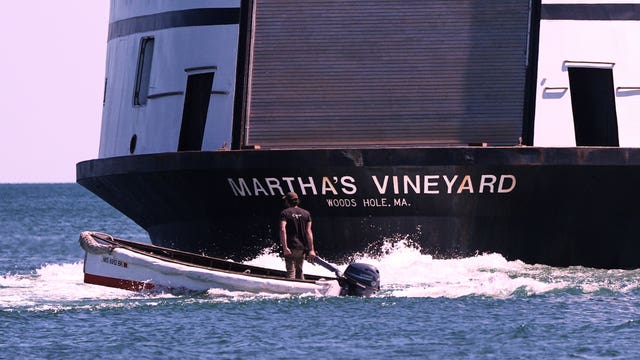The British endurance swimmer says ‘I’m frightened of sharks but I’m really frightened of a world without sharks’ ahead of his latest swim.
Endurance swimmer Lewis Pugh is embarking on a swim in a great white shark “hotspot” for the 50th anniversary of Jaws, as he calls for action to protect sharks.
The Plymouth-based swimmer is starting a 60-mile swim on Thursday around Martha’s Vineyard, an island off the east coast of the US where the blockbuster – which cast sharks as the ultimate underwater villain – was filmed.
He hopes the “challenging” 12-day swim will change the narrative around sharks, as he seeks to educate people on the value of the apex predators which pre-date the dinosaurs but are being pushed to extinction by humans.
“It’s the 50th anniversary of Jaws. It’s such an important moment to stop and reflect and tell the full story of sharks for a new generation,” he said.

Mr Pugh’s fight to highlight the overfishing, climate and pollution threats to the oceans and seek greater protection for the world’s seas has previously seen him take the water in places ranging from the South Atlantic to the English Channel up to the Arctic and Greenland’s Ilulissat glacier.
Speaking from Martha’s Vineyard before his latest swim, he told the PA news agency: “It’s a really beautiful island. It’s a small island unless you swim around it.”
He said the swim would be challenging because of the cold seas, currents, the distance he will be covering, and because the area was a global hotspot for great white sharks, adding: “this swim is going to test my body and my mind.”
Everybody he spoke to in Martha’s Vineyard had their own shark story, he said, and while he would be swimming with a support team and an electronic shark deterrent, it would not be risk-free.

“I’m a swimmer, I readily admit that I’m frightened of sharks.
“But I’m really frightened of a world without sharks, they’re essential for a healthy ocean.”
He pointed to what would happen if an apex predator was removed from the land, such as taking away lions from southern Africa’s veld or grasslands.
This would lead to a huge increase in species such as wildebeest that would overgraze the land and cause “ecological collapse”, he said.
Sharks eat fish which graze on ocean vegetation – and the loss of the predators would lead to overgrazing of seagrass meadows and kelp forests which are key habitats for numerous ocean species and a major carbon store.
Migratory sharks also cycle nutrients through marine ecosystems, and help store carbon at the bottom of the ocean through their faeces and when they die and their bodies sink to the seafloor.

Fossil records for sharks date back 400 million years, before the time of the dinosaurs, but while there are more than 500 species of shark in the oceans many species are at risk, conservationists warn.
Mr Pugh said: “The main direct threat to sharks is simply overfishing, 100 million sharks are killed every year, so on average that’s 274,000 every day. It’s ecocide.
“But I think the greatest threat is indifference, it’s the belief that sharks really don’t matter, that this catastrophic crash in their numbers will not ultimately impact you.
“It will, because they’re guardians of the oceans, and oceans are essential for all life on Earth,” he warned.
Protection of great white sharks has enabled the recovery of the species in the US, but sharks are at significant risk globally, he said.
“The challenge with sharks is they have been the most vilified out of all predators, the most feared out of all predators, and so I want to carry this message to other countries, to other swims in other countries where populations are crashing,” he said.

Mr Pugh is calling for an end to killing sharks, which are caught for their fins, oil, meat and sport, as well as “bycatch” in fisheries targeting other species.
And he is supporting the creation and enforcement of marine protected areas – ocean sanctuaries where nature is protected from harmful activities such as fishing – to meet the 30X30 commitment to fully protect 30% of the world’s oceans by 2030.
The swim kicks off a three-year campaign to engage a billion people worldwide with science, education and advocacy.
It comes before a key UN ocean conference in France in June, where governments are under pressure to ratify a global treaty to protect the high seas, end damaging fishing practices such as bottom trawling, and deliver on the 30X30 commitment to protect the world’s marine environment.
Carlos Manuel Rodríguez, chief executive of the Global Environment Facility, which funds international work on biodiversity and climate, said: “As a lifelong surfer and conservationist, I’ve seen firsthand how the ocean supports our communities.”
“Apex species like sharks not only signal the health of our oceans, they help maintain it. When sharks are at risk, so are we,” he warned.

